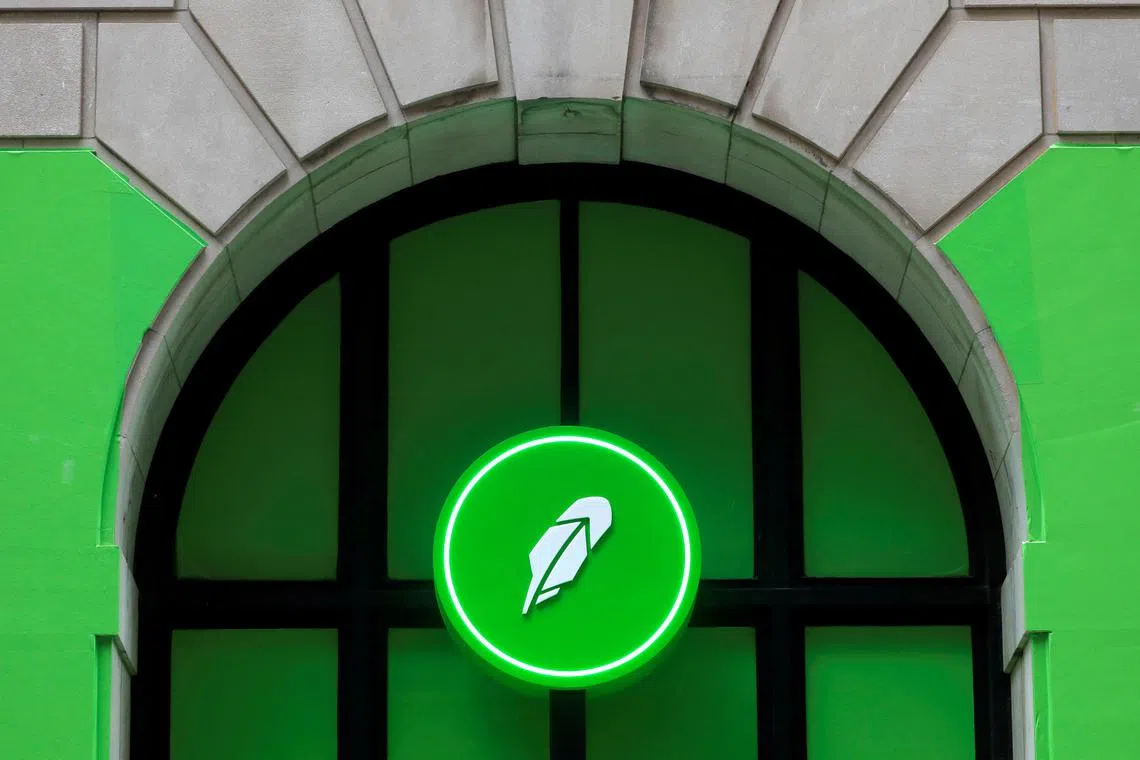Robinhood, AppLovin and Emcor to join S&P 500 in rebalancing of benchmark
Sign up now: Get ST's newsletters delivered to your inbox

Robinhood’s entry into the S&P 500 marks a milestone not just for the company, but also for the investing boom it helped define.
PHOTO: REUTERS
NEW YORK – Robinhood Markets has been added to the S&P 500, marking a new phase for the retail trading platform that helped define the pandemic-era boom in individual investing.
The company will join the benchmark in the latest quarterly rebalance, S&P Dow Jones Indices said on Sept 6.
AppLovin and Emcor Group will also be added to the index.
The three companies will replace MarketAxess Holdings, Caesars Entertainment and Enphase Energy prior to the start of trading on Sept 22.
Robinhood’s entry into the S&P 500 marks a milestone not just for the company, but also for the investing boom it helped define.
Once a symbol of pandemic-era excess, the trading app now oversees billions in customer assets, from options to crypto, proving a durable engine of retail market participation.
Shares of Robinhood were up more than 7 per cent in after-hours trading.
The milestone underscores how fast retail-driven companies can move from the edge of the financial system to its centre, as speculation reshapes markets, from meme stocks to digital assets. With its slick interface and zero-commission trades, Robinhood captured a growing share of that flow.
The implications extend beyond a single company. By joining the S&P 500, Robinhood enters the portfolios of index funds, pension plans and retirement accounts across the world – embedding a firm shaped by retail speculation into the core of institutional finance.
The shift reflects a new market reality: Once a disruptor of Wall Street, the Menlo Park, California-based firm is turning into one of its pillars. The company was founded in 2013 by current chief executive officer Vlad Tenev and his Stanford University classmate Baiju Bhatt, and has now taken market share from more traditional brokerages.
Shares of Emcor rose about 2.5 per cent, while Applovin increased 7.5 per cent, both in after-hours trading. Robinhood, AppLovin and Emcor did not immediately respond to requests for comment.
Robinhood went public at the height of the pandemic-era meme stock frenzy in July 2021. The user-friendly, app-based brokerage became a go-to place for retail investors to trade speculative tickers, including GameStop and AMC Entertainment Holdings.
Robinhood also joins other crypto-related peers such as Coinbase Global, the largest US cryptocurrency exchange, and Mr Jack Dorsey’s fintech payment firm Block.
Robinhood posted second-quarter revenue that beat Wall Street estimates, boosted by strength in cryptocurrency trading.
Total net revenue climbed 45 per cent from a year earlier, while net income more than doubled – also better than expected.
AppLovin, a mobile app marketing company, reported second-quarter results that beat expectations. The stock has been a strong performer of late, and has more than doubled in price since its April low.
Meanwhile, Emcor, a construction and facilities services firm, also reported revenue for the second quarter that beat the average analyst estimate.
Inclusion in the US equity gauge can elevate a company’s profile and boost demand for its shares from passive investment funds that track the index.
Companies must have a market capitalisation of at least US$22.7 billion (S$29.2 billion) and meet profitability, liquidity and share-float standards to qualify for the S&P 500, per guidelines.
Expulsion from the benchmark can weigh on stock prices, as index funds sell shares to realign with the S&P 500’s new composition.
In August, retail trading platform Interactive Brokers Group was added to replace Walgreens Boots Alliance, while Datadog gained entry to the benchmark in July. BLOOMBERG


